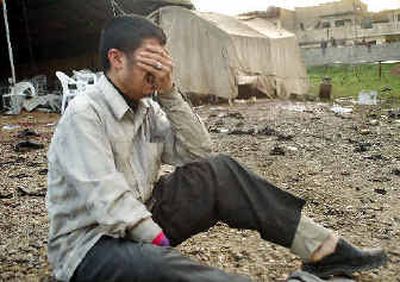Bomber kills 47 mourners at funeral at Mosul mosque

MOSUL, Iraq – A suicide attacker set off a bomb that tore through a funeral tent jammed with Shiite mourners Thursday, splattering blood and body parts over rows of overturned white plastic chairs. The attack, which killed 47 and wounded more than 100, came as Shiite and Kurdish politicians in Baghdad said they overcame a major stumbling block to forming a new coalition government.
The explosion, in a working class neighborhood of this northern city, destroyed a large tent pitched next to a smaller one on a grassy patch in the courtyard of a mosque. Survivors scrambled to get the wounded to a hospital, lugging them to ambulances and cars in blankets or prayer rugs as a strong smell of gunpowder filled the yard.
“As we were inside the mosque, we saw a ball of fire and heard a huge explosion,” said Tahir Abdullah Sultan, 45. “After that blood and pieces of flesh were scattered around the place.”
At first, some mourners thought it was an airstrike – but once they smelled the gunpowder, they said they knew it was a suicide bombing.
Blood was spattered across the grass, car windows were shattered and survivors wailed as corpses were loaded onto the backs of pickup trucks. Others simply folded newspapers over the faces of the dead. The body parts that were strewn around the area were believed to be of the bomber.
Shiite mosques and funerals have become a frequent target of Sunni-led insurgents. Last month, suicide bombers attacked a number of them during the Shiite commemoration of Ashoura, killing nearly 100 people.
Dealing with the persistent insurgency will be a main task for a new Iraqi government.
Officials said the deal between the Shiite clergy-backed United Iraqi Alliance and the Kurdish parties opens the way for naming a Cabinet when Iraq’s democratically elected National Assembly convenes Wednesday.
The Kurds agreed to support the alliance’s candidate for prime minister, Ibrahim al-Jaafari. In exchange, the alliance will back Jalal Talabani as Iraq’s first-ever Kurdish president. The Kurds will receive one major Cabinet post – one fewer than they demanded.
“We told the Kurds that if they are going to have the presidency, then they could have only one major cabinet post because Sunnis should have one major cabinet post,” said Ali al-Dabaghal, a ranking member of the alliance who has participated in the negotiations.
On the thorny issue of territory, officials in both political camps said the deal provides for the eventual return of 100,000 Kurdish refugees to the oil-rich city of Kirkuk, southwest of Mosul.
The government will discuss returning the refugees and redrawing existing Kurdish autonomous regions to include the city, according to the deal. While in power, Saddam Hussein relocated Iraqi Arabs to the region in a bid to secure the oil fields there and brutally expelled the Kurds. Many of the Kurds who want to return to Kirkuk are now living in tent cities.
Officials said any land agreement would be incorporated into the country’s new constitution, which must be drafted by mid-August and approved by referendum two months later.
“As for Kirkuk, we agreed to solve the issue in two steps. In the first step, the new government is committed to normalizing the situation in Kirkuk, the other step regarding annexing Kirkuk to Kurdistan is to be left until the writing of the constitution,” said Fuad Masoum, a member of the Kurdish coalition, who served as head of the Iraq’s former National Council.
He added that the new government “is obligated to normalization in Kirkuk, the return of deported Kurds to their main areas (in) Kirkuk.”
Al-Dabagh, the alliance member, confirmed that the government would deal with both issues.
“We agreed with the Kurds that these two issues are to be solved through the government and they agreed on this. … We told them that the issues will be discussed as soon as the central government is formed,” al-Dabagh said.
Other Kurdish demands include a share of the region’s oil revenues, the right to maintain their peshmerga militia and a bigger share of the national budget, more than the 17 percent they now receive.
The Kurds, who comprise about 15 percent of the population, emerged as king makers because they voted in large numbers in the Jan. 30 national elections and won 75 seats in the 275-member National Assembly. The alliance won 140 seats and needs Kurdish support to assemble the two-thirds majority to elect a president, who will then give a mandate to the prime minister.